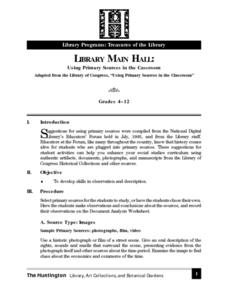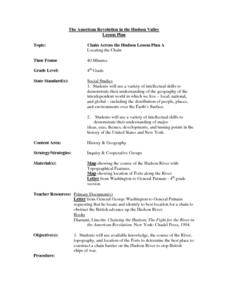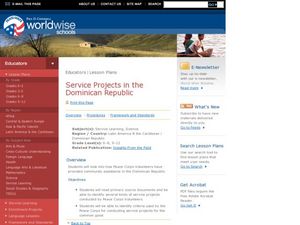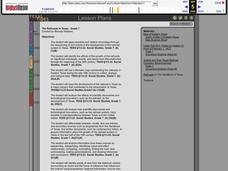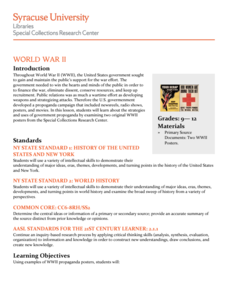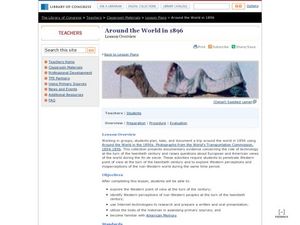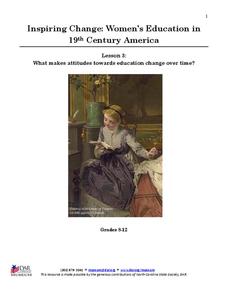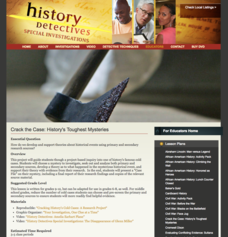Curated OER
Library Main Hall: Using Primary Sources in the Classroom
Students choose a historical photograph or film and try to predict what happened after the photo or film in question.
Curated OER
World War I
Eleventh graders investigate propaganda used during World War I. In this World War I instructional activity, 10th graders examine propaganda from the war and analyze war posters. Students then create their own propaganda posters on...
Curated OER
Perceptions of German Unification Over Time
Through a series of readings and handouts, learners will study the shifts in perception that followed the fall of the Berlin Wall. The history lesson plan focuses on periods of change in post WWII German history that led to a changed...
Curated OER
Chain Across the Hudson Lesson Plan A - Locating the Chain
Learners read a letter from George Washington requesting them to identify on a map a location that would stop the advance of British warships. They choose a location and justify their choice.
Curated OER
Service Projects in the Dominican Republic
Students examine the role of Peace Corps volunteers. In this service instructional activity, students investigate service projects that feature agriculture, small business, education, environmental education, and health concerns in the...
Center for History Education
Road to Revolution: How did Actions and Responses Lead to an Independent United States?
Using primary sources, maps, and an interactive M&M game, young historians examine the American revolution as if they were detectives trying to solve a crime. Resource includes graphic organizers and a final writing prompt to aid...
Curated OER
The Railroads in Texas
Seventh graders differentiate between, locate, and use primary and secondary sources, such as biographies from the Handbook of Texas. They analyze the effects of scientific discoveries and technological innovations, such as the railroad,...
Curated OER
The U.S. Constitution:Continuity and Change in the Governing of the United States
Students interpret historical evidence presented in primary and secondary resources. In this U.S. Constitution lesson, students examine and analyze primary sources regarding the plan for U.S. government.
Syracuse University
Ancient World Writing System
Most twenty-first century pupils don't know how to interpret cuneiform. Examining images of cuneiform and papyrus writing and using a chart and Venn diagram, young historians extrapolate what life may have been like for people who lived...
Syracuse University
World War I
World War I was known for its gruesome battlefields and horrific injuries. Using photographs from a battlefield surgeon's scrapbook, scholars see first-hand what life was like in the trenches. After creating a timeline of the war using...
Historical Thinking Matters
Rosa Parks: 1 Day Lesson
You've heard of the historical moment when Rosa Parks refused to give up her seat on a bus, but did you know that some historical accounts disagree on where she sat? Investigate this query with your young historians, and practice...
Syracuse University
World War II
During World War II propaganda was as important to the war effort as the soldiers in the field. Scholars consider how the government communicated messages of patriotism with propaganda by examining pieces from World War II. Then, they...
Curated OER
Around the World in 1896
Middle schoolers work in groups to plan, take and document a trip using an Internet Database of primary sources "Around the Wolrd in the 1890's." This enables students to break old western perspectives of other nations as they analyze...
Concordia College Archives
Introduction and Student Inquiry
Introduce young musicians to the history of and different styles of music with an inquiry-based learning activity that asks them to play detectives to determine the similarities and differences among the sheet music found at a series of...
National Woman's History Museum
Inventive Women - Part 1
While a woman didn't invent the parasol, three women received patents for their improvements to the original design of umbrellas. In the first of a two-part series on inventive women, class members investigate the patent system to...
Curated OER
Teaching Six Big Ideas in the Constitution
Students debate the constitutional principles of the United States. In this U.S. government activity, students examine the meaning of the text of the U.S. Constitution and analyze other primary documents of the era. Students prepare for...
Curated OER
Civil War Photographs: The Mathew Brady Bunch
Students examine the photographs of Mathew Brady. For this Civil War lesson, students analyse primary source photographs from the Civil War. Students will be able to describe specific events and what life might be like during the Civil War.
Library of Congress
Stars, Stripes and Symbols of America: Comparing Our Flag, Past and Present
Your young historians will compare and contrast the details of the American flag today with an an image of the nation's flag from the post-Civil War era, and identify the flag's importance as a national symbol through analysis...
Daughters of the American Revolution
Lesson 2: How Do We Determine the Value of Education?
Have women always had the same educational opportunities as their male counterparts? Young historians read an 1819 essay by Emma Willard on the state of female education in the 19th century before discussing their views regarding women's...
National Society Daughters of the American Revolution
Lesson 3: What Makes Attitudes Towards Education Change over Time?
The struggle for women's rights is not unique to this generation, or even to the 20th century. Class members explore the conflicting opinions of Alexander Graham Bell and his wife, Mabel Hubbard Bell, regarding women's pursuits of higher...
Eastconn
Women of the California Gold Rush
The California Gold Rush was not just an opportunity for the male gold miners sifting for shiny nuggets. Small groups read accounts of the ways women took advantage of the influx of workers to run hotels, bake pies, and wading out into...
Curated OER
Hear Ye, Hear Ye: Read All About It!
Develop an online newspaper covering the Lewis and Clark Expedition. The class publishes their newspaper on the school's Web site and analyze both primary and secondary sources.
Curated OER
Primary and Secondary Sources
Students understand what primary and secondary sources are. In this primary and secondary sources instructional activity, students take a list of sources and break down to primary and secondary sources.
PBS
Crack the Case: History's Toughest Mysteries
Young sleuths don their trench coats, tip their fedoras, and grab their notepads to investigate one of four famous unsolved mysteries. After examining multiple primary and secondary sources related to their cold case, they propose a...
Other popular searches
- Using Primary Sources
- Wwi, Primary Sources
- Rosa Parks Primary Documents
- Gilded Age Primary Sources
- Working With Primary Sources
- Primary Resources Hsie
- Web Quests Primary Sources
- Ancient Rome Primary Sources
- 1920 1929 Primary Sources
- Primary Sources and Family
- Conscription Primary Sources
- Scotland Primary Sources
